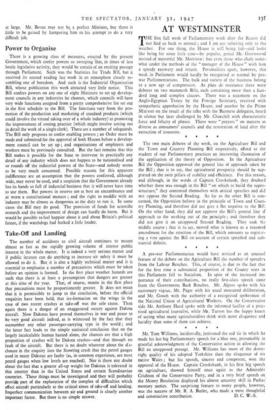AT WESTMINSTER
THE first full week of Parliamentary work after the Recess did not find us back to normal ; and I am not referring only to the weather. For one thing, the House is still being led—and looks' like being for some little time—by popular, genial Mr. Greenwood! instead of masterful Mr. Morrison: but even those who chafe some- what under the methods of the " manager of the House" wish him a speedy recovery and return. Personalities apart, however, this week in Parliament would hardly be recognised as normal by pre- war Parliamentarians. The bulk and variety of the business belong to a new age of compression. As plats de resistance there were debates on two mammoth Bills, each containing more than a hun- dred long and complex clauses. There was a statement on the Anglo-Egyptian Treaty by the Foreign Secretary, received with sympathetic approbation by the House, and another by the Prime Minister on the result of the talks with the Burmese delegates, heard in silence but later challenged by Mr. Churchill with characteristic force and felicity of phrase. There were " prayers " on matters as diverse as consumers' councils and the restoration of land after the extraction of ironstone.
* * * The two main debates of the week, on the Agriculture Bill and the Town and Country Planning Bill respectively, afford to the student of our Parliamentary practices an interesting illustration of the application of the theory of Opposition. In the Agriculture Bill the Opposition approved the general line of approach taken by the Bill ; that is to say, that agricultural prosperity should be sup- ported on the twin pillars of stability and efficiency. For this reason, and although, in the words of Captain Crookshank, they doubted whether there was enough in the Bill " on which to build the super- structure," they contented themselves with critical speeches and did not oppose the Second Reading. So far as the other Bill is con- cerned, the Opposition believe in the principle of Town and Coun- try Planning, and therefore did not give a flat negative to the Bill. On the other hand, they did not approve the Bill's general line of approach to the working out of the principle ; and therefore they did not give it an unopposed Second Reailing. They took the middle course ; that is to say, moved what is known as a reasoned amendment for the rejection of the Bill, which amounts to register- ing a vote against the Bill on account of certain specified and sub- stantial defects.
* * A pre-war Parliamentarian would have noticed as an unusual feature of the debate on the Agriculture Bill the number of speeoht.s from the Labour Benches. This, of course, is due to the fact that for the first time a substantial proportion of the County seats in this Parliament fell to Socialism. In spite of the increased im- portance of their contributions, no really first-class speech came from the Government Back Benches. Mr. Alpass spoke with his customary vigour, Mr. Paget with his usual measured deliberation, and Mr. Gooch with the authority of a recognised spokesman of the National Union of Agricultural Workers. On the Conservative side Mr. Anthony Hurd spoke with the informed facility of a prac- tised agricultural journalist, while Mr. Turton has the happy knack of saying what many agriculturalists think with more eloquence and lucidity than some of them can achieve.
Mr. Tom Williams, incidentally, jettisoned the red tie in which he made his last big Parliamentary speech for a blue one, presumably in graceful acknowledgment of the Conservative action in allowing the Bill an unopposed passage. Mr. Williams has more of the down- right quality of his adopted Yorkshire than the eloquence of nis native Wales ; but his speech, sincere and competent, won the approval of the House. Captain Crookshank, in his first big speech on agriculture, showed himself once again as the Admirable Crichton of the Conservative Party, and in a very brief speech on the Money Resolution displayed his almost uncanny skill in Parka= mentary tactics. The surprising feature to many people, however, was the success of Mr. R. A. Butler, who made a most thoughtful


































 Previous page
Previous page